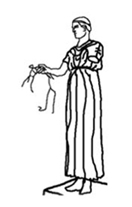
Design about
the Charioteer of
Delphi, around 470 B.C., bronze, height 180cm
The fuss about
metaphorics about the carriage driver has started very
early. And the
most famous example for charioteer and spiritual
conditions is to
be found in Phaidros.
The by Platon recorded dialog between Socrates and Platon is about a proof for the immortality of the soul. The proof lies in the continuous moving being immortal.
Continously moving is what moves itself because it has the principle of movement within itself. But the sould moves the living being and itself. It cannot leave itself being a moving principle hence it is immortal.
Socrates connects a myth with these words to cast a light to the establishing and the life destiny of the soul. In the beginning the souls lived amongst the gods and took part in their heavenly carriage ride. Obviously a kind of godly occupation during off-time. The gods have only noble horses, but the soul, whose carriage is steered by reason has one noble heavenly horse - the mind, and one wild, shaggy, stubborn earthern horse - the drive. During the carriage ride in the company of the gods the path leads steeply to the edge of the world, to the back of heaven: here the driver of the soul carriage - the reason - can view the ideas being at home in the above-heavenly region: creatures colorless, without matter nor form, existing in truth not every soul can climb up here but the one that manages falls and sinks down to earth because of the stubborn and clumsy behaviour of the earthern horse. Here it can crasp the generell truth but only if it succeeded beforehand in seeing the ideas. When the soul of the human being sees something beautiful on earth it is reminded of the ideas and it falls in love: this 'craziness' reminds the sould of its actual home.
The crucial passage in Phaidros is:
"But in those times beauty was brightly seen when we enjoyed blessed viewing and looking with the happyfying round in the entourage with the gods and when we were initiated in the dedication which is to be called the most blessed holy duty, and the one we celebrated when still being without fault and untouched by evils which awaited us in later times, as pure selves and not enclosed in those bodies as we call it now what we carry around with us connected like the oyster. This may be dedicated to the memory for which in longing for the times gone has been talked about in detail." (Phaidros)
Loss of control
In memory of a failed carriage drive and contemplation of beauty one creates vehicles. Metaphorical and real ones, in order to let the beauty then fall together in a body-space feeeling that is perceived as reconciled. Therefore looking at art, therefor sports and therefor carrriage races. The comparison group of modern times for the ancient carriage driver are motorcycle drivers.
The by Platon recorded dialog between Socrates and Platon is about a proof for the immortality of the soul. The proof lies in the continuous moving being immortal.
Continously moving is what moves itself because it has the principle of movement within itself. But the sould moves the living being and itself. It cannot leave itself being a moving principle hence it is immortal.
Socrates connects a myth with these words to cast a light to the establishing and the life destiny of the soul. In the beginning the souls lived amongst the gods and took part in their heavenly carriage ride. Obviously a kind of godly occupation during off-time. The gods have only noble horses, but the soul, whose carriage is steered by reason has one noble heavenly horse - the mind, and one wild, shaggy, stubborn earthern horse - the drive. During the carriage ride in the company of the gods the path leads steeply to the edge of the world, to the back of heaven: here the driver of the soul carriage - the reason - can view the ideas being at home in the above-heavenly region: creatures colorless, without matter nor form, existing in truth not every soul can climb up here but the one that manages falls and sinks down to earth because of the stubborn and clumsy behaviour of the earthern horse. Here it can crasp the generell truth but only if it succeeded beforehand in seeing the ideas. When the soul of the human being sees something beautiful on earth it is reminded of the ideas and it falls in love: this 'craziness' reminds the sould of its actual home.
The crucial passage in Phaidros is:
"But in those times beauty was brightly seen when we enjoyed blessed viewing and looking with the happyfying round in the entourage with the gods and when we were initiated in the dedication which is to be called the most blessed holy duty, and the one we celebrated when still being without fault and untouched by evils which awaited us in later times, as pure selves and not enclosed in those bodies as we call it now what we carry around with us connected like the oyster. This may be dedicated to the memory for which in longing for the times gone has been talked about in detail." (Phaidros)
Loss of control
In memory of a failed carriage drive and contemplation of beauty one creates vehicles. Metaphorical and real ones, in order to let the beauty then fall together in a body-space feeeling that is perceived as reconciled. Therefore looking at art, therefor sports and therefor carrriage races. The comparison group of modern times for the ancient carriage driver are motorcycle drivers.